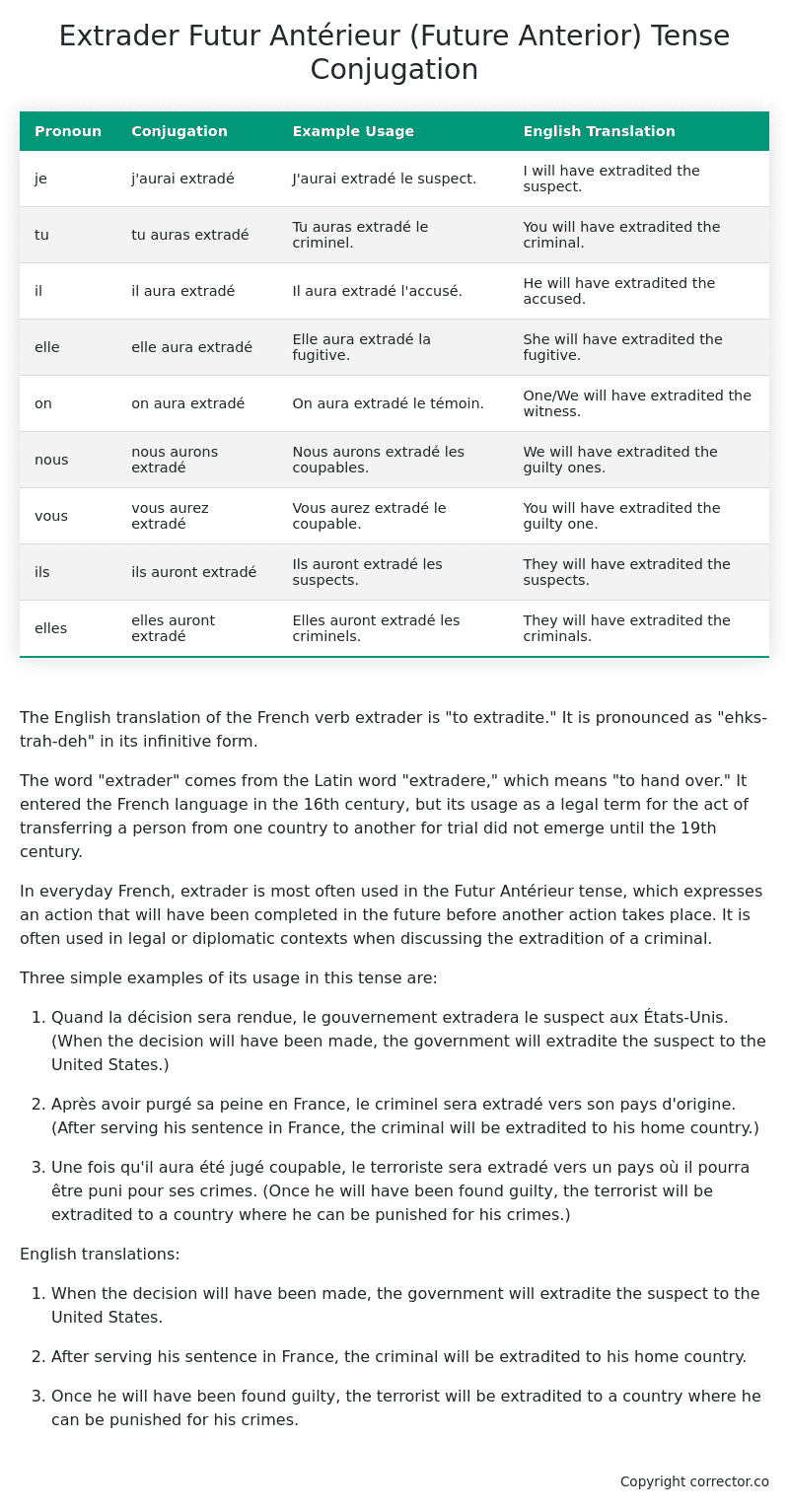Futur Antérieur (Future Anterior) Tense Conjugation of the French Verb extrader
Introduction to the verb extrader
The English translation of the French verb extrader is “to extradite.” It is pronounced as “ehks-trah-deh” in its infinitive form.
The word “extrader” comes from the Latin word “extradere,” which means “to hand over.” It entered the French language in the 16th century, but its usage as a legal term for the act of transferring a person from one country to another for trial did not emerge until the 19th century.
In everyday French, extrader is most often used in the Futur Antérieur tense, which expresses an action that will have been completed in the future before another action takes place. It is often used in legal or diplomatic contexts when discussing the extradition of a criminal.
Three simple examples of its usage in this tense are:
-
Quand la décision sera rendue, le gouvernement extradera le suspect aux États-Unis. (When the decision will have been made, the government will extradite the suspect to the United States.)
-
Après avoir purgé sa peine en France, le criminel sera extradé vers son pays d’origine. (After serving his sentence in France, the criminal will be extradited to his home country.)
-
Une fois qu’il aura été jugé coupable, le terroriste sera extradé vers un pays où il pourra être puni pour ses crimes. (Once he will have been found guilty, the terrorist will be extradited to a country where he can be punished for his crimes.)
English translations:
-
When the decision will have been made, the government will extradite the suspect to the United States.
-
After serving his sentence in France, the criminal will be extradited to his home country.
-
Once he will have been found guilty, the terrorist will be extradited to a country where he can be punished for his crimes.
Table of the Futur Antérieur (Future Anterior) Tense Conjugation of extrader
| Pronoun | Conjugation | Example Usage | English Translation |
|---|---|---|---|
| je | j’aurai extradé | J’aurai extradé le suspect. | I will have extradited the suspect. |
| tu | tu auras extradé | Tu auras extradé le criminel. | You will have extradited the criminal. |
| il | il aura extradé | Il aura extradé l’accusé. | He will have extradited the accused. |
| elle | elle aura extradé | Elle aura extradé la fugitive. | She will have extradited the fugitive. |
| on | on aura extradé | On aura extradé le témoin. | One/We will have extradited the witness. |
| nous | nous aurons extradé | Nous aurons extradé les coupables. | We will have extradited the guilty ones. |
| vous | vous aurez extradé | Vous aurez extradé le coupable. | You will have extradited the guilty one. |
| ils | ils auront extradé | Ils auront extradé les suspects. | They will have extradited the suspects. |
| elles | elles auront extradé | Elles auront extradé les criminels. | They will have extradited the criminals. |
Other Conjugations for Extrader.
Le Present (Present Tense) Conjugation of the French Verb extrader
Imparfait (Imperfect) Tense Conjugation of the French Verb extrader
Passé Simple (Simple Past) Tense Conjugation of the French Verb extrader
Passé Composé (Present Perfect) Tense Conjugation of the French Verb extrader
Futur Simple (Simple Future) Tense Conjugation of the French Verb extrader
Futur Proche (Near Future) Tense Conjugation of the French Verb extrader
Plus-que-parfait (Pluperfect) Tense Conjugation of the French Verb extrader
Passé Antérieur (Past Anterior) Tense Conjugation of the French Verb extrader
Futur Antérieur (Future Anterior) Tense Conjugation of the French Verb extrader (this article)
Subjonctif Présent (Subjunctive Present) Tense Conjugation of the French Verb extrader
Subjonctif Passé (Subjunctive Past) Tense Conjugation of the French Verb extrader
Subjonctif Imparfait (Subjunctive Imperfect) Tense Conjugation of the French Verb extrader
Subjonctif Plus-que-parfait (Subjunctive Pluperfect) Tense Conjugation of the French Verb extrader
Conditionnel Présent (Conditional Present) Tense Conjugation of the French Verb extrader
Conditionnel Passé (Conditional Past) Tense Conjugation of the French Verb extrader
L’impératif Présent (Imperative Present) Tense Conjugation of the French Verb extrader
L’infinitif Présent (Infinitive Present) Tense Conjugation of the French Verb extrader
Struggling with French verbs or the language in general? Why not use our free French Grammar Checker – no registration required!
Get a FREE Download Study Sheet of this Conjugation 🔥
Simply right click the image below, click “save image” and get your free reference for the extrader Futur Antérieur tense conjugation!

Extrader – About the French Futur Antérieur (Future Anterior) Tense
Construction
Common Everyday Usage Patterns
Interactions with Other Tenses
For example
Summary
I hope you enjoyed this article on the verb extrader. Still in a learning mood? Check out another TOTALLY random French verb conjugation!


